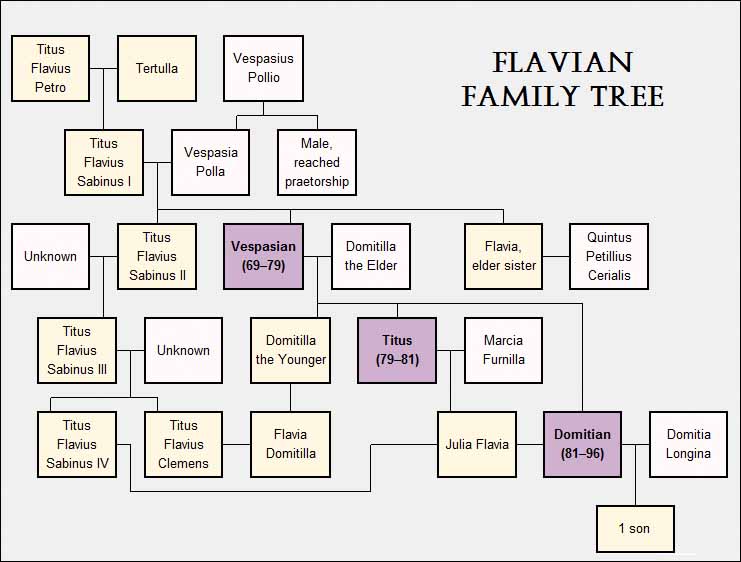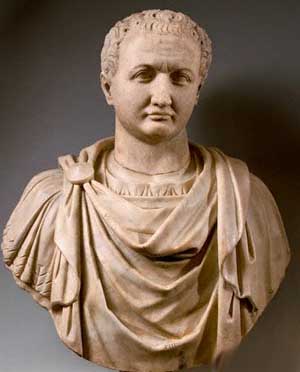
10th Emperor of the Roman Empire

10th Emperor of the Roman Empire
Titus (30 December 39 - 13 September 81), was Roman Emperor succeeding his father Vespasian upon his death, thus becoming the first Roman Emperor to come to the throne after his own father.
Prior to becoming Emperor, Titus gained renown as a military commander, serving under his father in Judaea during the First Jewish-Roman War. The campaign came to a brief halt with the death of emperor Nero in 68, launching Vespasian's bid for the imperial power during the Year of the Four Emperors. When Vespasian was declared Emperor on 1 July 69, Titus was left in charge of ending the Jewish rebellion.
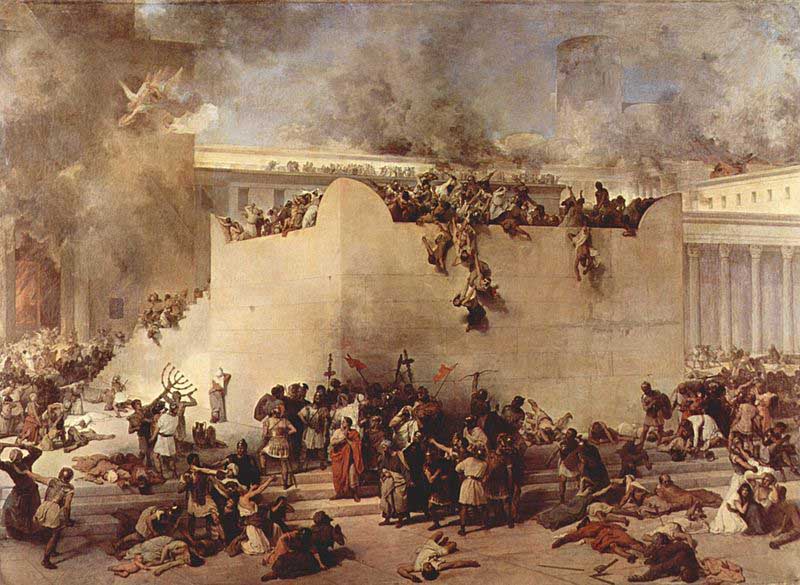
In 70, he successfully laid siege to and destroyed the city and Temple of Jerusalem.
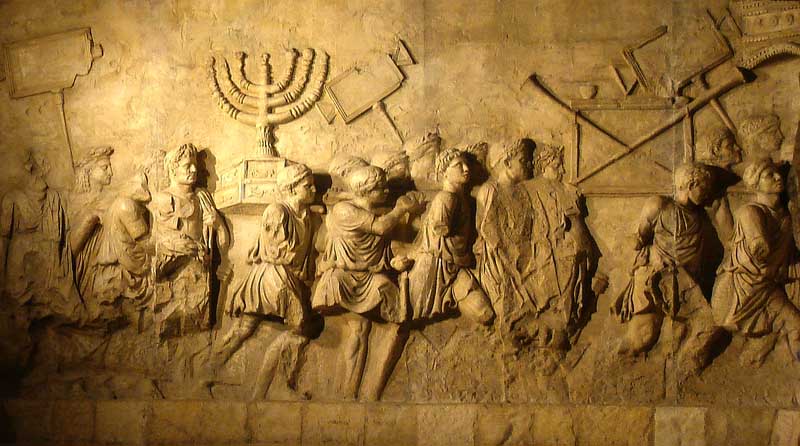
Titus' triumph after the First Jewish-Roman War was celebrated with the Arch of Titus in Rome, which shows the treasures taken from the Temple in Jerusalem, including the Menorah and the trumpets of Jericho.
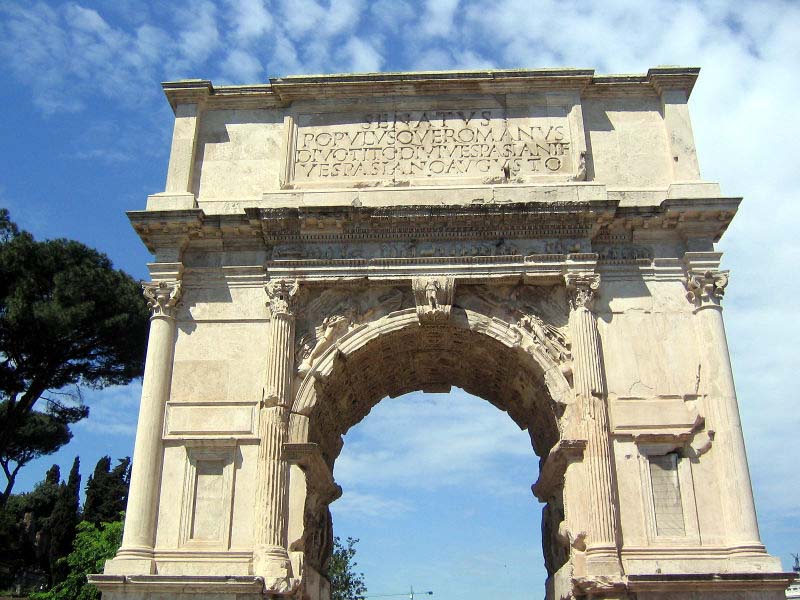
For this achievement Titus was awarded a triumph;
the Arch of Titus commemorates his victory to this day.
Under the rule of his father, Titus gained notoriety in Rome serving as prefect of the Praetorian Guard, and for carrying on a controversial relationship with the Jewish queen Berenice. Despite concerns over his character, Titus ruled to great acclaim following the death of Vespasian in 79, and was considered a good emperor by Suetonius and other contemporary historians. As emperor, he is best known for completing the Colosseum and for his generosity in relieving the suffering caused by two disasters, the Mount Vesuvius eruption of 79 and a fire in Rome in 80.
Although his administration was marked by a relative absence of major military or political conflicts, Titus faced a number of major disasters during his brief reign. On 24 August 79, two months after his accession, Mount Vesuvius erupted, resulting in the almost complete destruction of life and property in the cities and resort communities around the Bay of Naples.
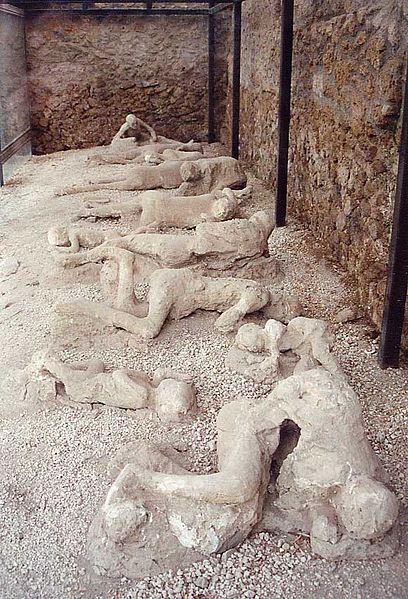
The cities of Pompeii and Herculaneum were buried under metres of stone and lava, killing thousands of citizens. Titus appointed two ex-consuls to organize and coordinate the relief effort, while personally donating large amounts of money from the imperial treasury to aid the victims of the volcano. Additionally, he visited Pompeii once after the eruption and again the following year.
During the second visit, in spring of AD 80, a fire broke out in Rome, burning large parts of the city for three days and three nights. Although the extent of the damage was not as disastrous as during the Great Fire of 64 - crucially sparing the many districts of insulae-Cassius Dio records a long list of important public buildings that were destroyed, including Agrippa's Pantheon, the Temple of Jupiter, the Diribitorium, parts of Pompey's Theatre and the Saepta Julia among others. Once again, Titus personally compensated for the damaged regions. According to Suetonius, a plague similarly struck during the fire. The nature of the disease, however, or the death toll are unknown.
Meanwhile war had resumed in Britannia, where Gnaeus Julius Agricola pushed further into Caledonia and managed to establish several forts there. As a result of his actions, Titus received the title of Imperator for the fifteenth time.
His reign also saw the rebellion led by Terentius Maximus, one of several false Neros who continued to appear throughout the 70s. Although Nero was primarily known as a universally hated tyrant - there is evidence that for much of his reign, he remained highly popular in the eastern provinces. Reports that Nero had in fact survived the assassination attempts were fueled by the vague circumstances surrounding his death and several prophecies foretelling his return.
According to Cassius Dio, Terentius Maximus resembled Nero in voice and appearance and, like him, sang to the lyre. Terentius established a following in Asia minor but was soon forced to flee beyond the Euphrates, taking refuge with the Parthians. In addition, sources state that Titus discovered that his brother Domitian was plotting against him but refused to have him killed or banished.
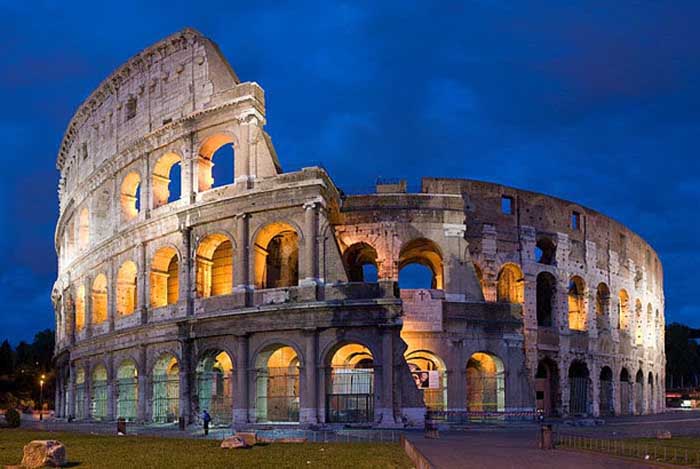
The Flavian Amphitheatre, better known as the Colosseum, was completed during
the reign of Titus and inaugurated with spectacular games that lasted for 100 days.
Construction of the Flavian Amphitheatre, presently better known as the Colosseum, was begun in 70 under Vespasian and finally completed in 80 under Titus. In addition to providing spectacular entertainments to the Roman populace, the building was also conceived as a gigantic triumphal monument to commemorate the military achievements of the Flavians during the Jewish wars.
The inaugural games lasted for a hundred days and were said to be extremely elaborate, including gladiatorial combat, fights between wild animals (elephants and cranes), mock naval battles for which the theatre was flooded, horse races and chariot races. During the games, wooden balls were dropped into the audience, inscribed with various prizes (clothing, gold, or even slaves), which could then be traded for the designated item.
Adjacent to the amphitheatre, within the precinct of Nero's Golden House, Titus had also ordered the construction of a new public bath-house, which was to bear his name. Construction of this building was hastily finished to coincide with the completion of the Flavian Amphitheatre.
Practice of the imperial cult was revived by Titus, though apparently it met with some difficulty as Vespasian was not deified until six months after his death. To further honor and glorify the Flavian dynasty, foundations were laid for what would later become the Temple of Vespasian and Titus, which was finished by Domitian.
At the closing of the games, Titus officially dedicated the amphitheatre and the baths, which was to be his final recorded act as Emperor. He set out for the Sabine territories but fell ill at the first posting station where he died of a fever, reportedly in the same farm-house as his father. Allegedly, the last words he uttered before passing away were: "I have made but one mistake". Titus had ruled the Roman Empire for just over two years, from the death of his father in 79 to his own on 13 September 81. He was succeeded by Domitian, whose first act as emperor was to deify his brother.
Historians have speculated on the exact nature of his death, and to which mistake Titus alluded in his final words. Philostratus writes that he was poisoned by Domitian with a sea hare, and that his death had been foretold to him by Apollonius of Tyana.[80] Suetonius and Cassius Dio maintain he died of natural causes, but both accuse Domitian of having left the ailing Titus for dead. Consequently, Dio believes Titus's mistake refers to his failure to have his brother executed when he was found to be openly plotting against him.
According to the Babylonian Talmud, an insect flew into Titus's nose and picked at his brain for seven years. He noticed that the sound of a blacksmith hammering caused the ensuing pain to abate, so he paid for blacksmiths to hammer nearby him; however, the effect wore off and the insect resumed its gnawing. When he died, they opened his skull and found the insect had grown to the size of a bird. The Talmud gives this as the cause of his death and interprets it as divine retribution for his wicked actions.
